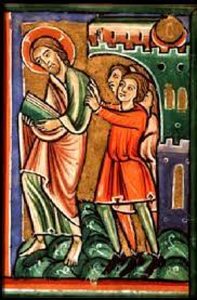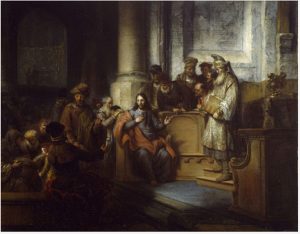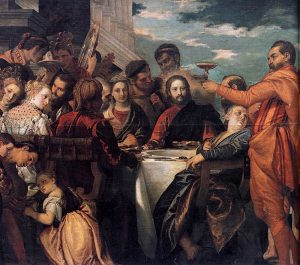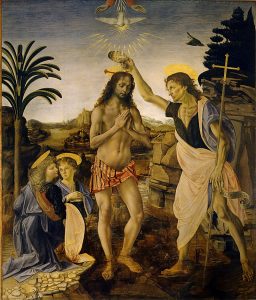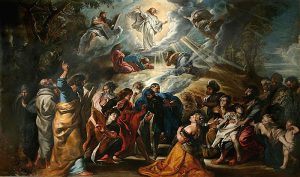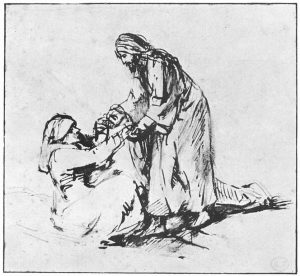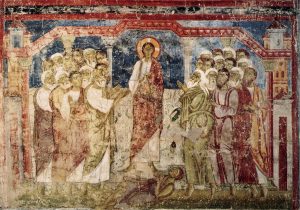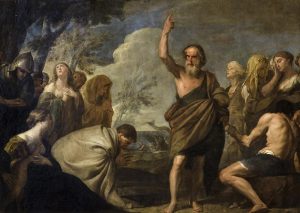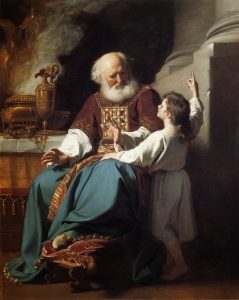Thoughts on Sunday’s Lessons for Feb. 6, 2022 (Epiphany 5C)
First Reading: Isaiah 6:1-8
It is difficult for prophets to resist the power of God’s call to serve. We hear this through Sunday’s readings in God’s call to the Prophet Isaiah; the Psalmist’s conversation with a faithful God; Paul’s call as an apostle of Christ, and Jesus calling his apostles at the Sea of Galilee.
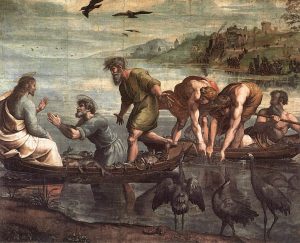
The Miraculous Draft of Fishes (1515), drawing in preparation for a tapestry by Raphael (1483-1520). The Royal Collection, Victoria and Albert Museum, London. (Click image to enlarge.)
In the first reading, Isaiah is granted a terrifying vision of a gigantic God on a throne surrounded by six-winged seraphim. This appearance is so majestic, so startling, that the prophet fears for his life, shouting that he is but an unworthy creature with unclean lips. But God sends a seraph carrying a hot coal to touch Isaiah’s lips and thus blot out his sin. Then Isaiah eagerly accepts God’s call, responding faithfully, “Here I am! Send me!”
Psalm: Psalm 138
Echoing the hope for return from exile and eventual salvation that we heard in the Isaiah reading, Psalm 138 thanks and praises God’s love and faithfulness. When we called, the Psalmist sings, God answered us and gave us strength. The litany of praise goes on: Although God is high, God cares for the lowly; God keeps us safe when we walk in the midst of trouble. The love of the Lord endures forever, the Psalmist sings. God will not abandon the works of God’s hands.
Second Reading: 1 Corinthians 15:1-11
In the second-to-last chapter of 1 Corinthians, Paul begins summing up. He turns to the good news of Christ’s resurrection, declaring its central place in Christian theology. Christ died for our sins, was buried, was raised on the third day, and was then seen by the Apostles and by hundreds of followers. Acknowledging his unfitness to serve Christ as one who persecuted the church, Paul declares himself the least of the apostles. He was the last to see Christ, he writes, but now he has been forgiven in spite of his sins and chosen to serve, not through his own merits but through God’s saving grace.
Gospel: Luke 5:1-11
Jesus has left behind his angry neighbors who wanted to throw him off a cliff following his challenging remarks in his home synagogue in Nazareth. He moves on, followed by crowds, and now, in Luke’s account, he calls his first apostles. Jesus, teaching a huge crowd near the lake of Gennesaret (Galilee), got into Simon’s boat to address the people. Then he told Simon to head for deep water and put out his fishing nets. Simon was doubtful, since they had fished all night without success. But he trusted Jesus, and caught more fish than the nets could hold. Peter, in a response that might remind us of Isaiah’s fearful plea to God, dropped to his knees and told Jesus to leave him, a sinful man. But Jesus, told him not to be afraid. Jesus called them, and Simon, James and John eagerly dropped everything and followed him.

